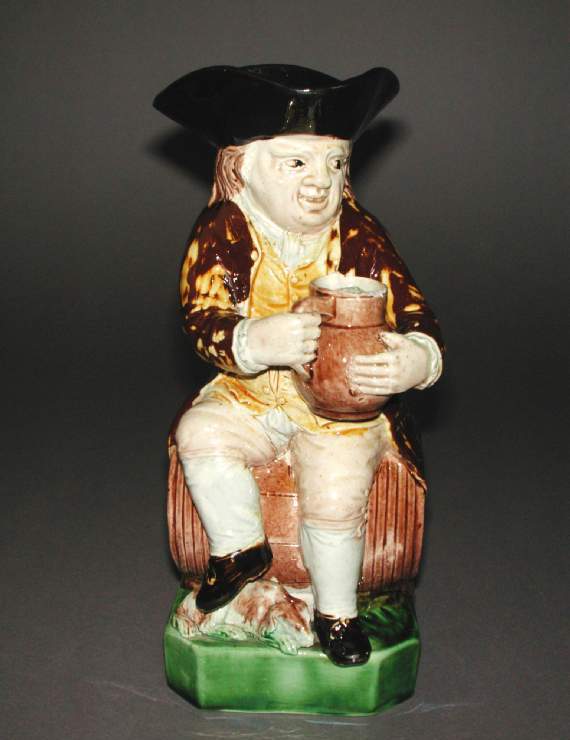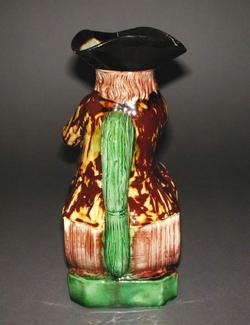Current Location: Gallery 27 (Glaisher)
Maker(s)
Production:
Unidentified Staffordshire factory
Production:
Wood, John (II)
(Possibly)
Entities
Categories
Description
Lead-glazed earthenware jug in the form of a man holding a jug of ale, and sitting on a barrel with his dog beside his feet
Cream earthenware, press-moulded and decorated with dark brown and red-brown slips, underglaze oxide colours and blue-tinted clear and green lead-glazes. The jug is in the form of a man wearing a dark-brown cocked hat, a long brown and yellow coat, pale brown knee breeches and dak brown shoes, seated on a barrel laid on its side, with a spaniel lying in front of it at his feet. He faces towards the viewer, with his head turned to his left, and holds a bulbous pale brown jug filled with foaming ale in both hands. The green-glazed square base has cut corners, and is slightly concave and unglazed underneath. The handle, also green, rises from the top of the base in the form of a looped branch.
Notes
History note: Stoner & Evans, London, from whom purchased for £60
Legal notes
Purchased with the Glaisher Fund
Measurements and weight
Depth: 14 cm
Height: 24.2 cm
Width: 10.5 cm
Acquisition and important dates
Method of acquisition: Bought
(1930-12-05)
by
Stoner & Evans
Dating
18th Century, Late
George III
Circa
1785
CE
-
Circa
1800
CE
Note
Anthony Griffiths (see Documentation) has shown that the original Toby character was Edward King, a London journalist, known as Toby. In 1717 he was imprisoned for distributing a controversial political pamphlet, and after regaining his freedom, retired to his home town, Coventry, where he opened a coffee house, selling ale and strong liquors, which was called 'Toby's Coffee House'. He was known to his relatives and friends as a heavy drinker, and died reputedly from jaundice in 1722. The production of the pottery jugs seems to have been influenced by the popularity of a poem by the Rev Francis Fawkes (1720-77), a scholar of Jesus College, Cambridge. It had been published in the 'Gentleman's Magazine' in 1754, but became well-known when it was included as 'The Brown Jug' in 'Original poems and translations by Francis Fawkes M.A.', published in 1761. It began: 'Dear Tom, this brown jug that now foams with mild ale,/ (In which I will drink to sweet Nan of the Vale)/ Was once Toby Fillpott, a thirsty old soul/As e'er drank a bottle or fathom'd a bowl; In boosing about 'twas his praise to excell,/And among jolly topers he bore off the bell.' Falkes' poem imitates a 16th century Latin poem by Girolamo Amalteo which featured a stout German drinker called Gubertus. It seems likely that Fawkes was familiar with the story of the original heavy-drinking Toby, and called him Fillpott as a pun on Philpot, meaning a lover of the beer pot. The poem was set to music and included John O'Keefe's popular play, 'The Poor Soldier', performed at the Theatre Royal, Covent Garden, in 1783. The song became very popular and a sequel to the poem, 'Agnes and Toby' by 'T.B. Esq.; was published in 1789. Two prints showing stout jovial men seated holding jugs full of ale may have contributed to the popularity of the jugs: 'Toby Philpo't, a mezzotint after Robert Dighton, published by Carington Bowles, on 3 April 1786, and 'The Hearty Good Fellow, a mezzotint published by Robert Sayer on 1 September 1786. The original source of the Toby's design is not known, but it is possible that a Staffordshire potter could have gained their inspiration from one of the Delftware figures of a man seated astride a barrel made in the third quarter of the 18th century, such as the Fitzwilliam's C.2771-1928 and C.2773-1928.
Typical Toby Jugs are made in the shape of a man wearing a tricorne hat, seated, sometimes on a barrel, holding a jug of ale in one or both hands. Some Tobys also hold a small drinking cup or a pipe, and may be accompanied by a dog. The earliest known reference to 'Toby Jugs' was in 1785 when the sales ledger of the potter, John Wood, of Brownhills, records that he sold nine examples to three different customers between September and November. By the end of 1786 he had sold 124, among them three Tobys 'sitting on a barrel' sold in June 1786. It therefore seems likely that their production in north Staffordshire began about that time, or a little earlier, and that there was a craze for them in the mid to late 1780s. They were made in several ceramic techniques, and by many potters between then and the 20th century. The earliest recorded dated example, of 1789, was sold at Bonham's Knightsbridge,on 23 June 2021, lot 81. The only known 18th century representation of a recognizable 'Toby' is in a hand-coloured etching 'A Smoking Club' by John Casper Ziegler after G. Woodward, published in 1798, which shows gentlemen smoking and drinking around a table bearing a punch bowl and a Toby Jug.
People, subjects and objects depicted
Components of the work
Decoration
composed of
lead-glaze
( base unglazed)
Base
Width 10 cm
Visible Surfaces
Materials used in production
cream
Earthenware
Techniques used in production
Press-moulding
: Cream-coloured earthenware, press-moulded in parts and assembled, decorated with dark brown and brown slip, and clear bluish, green, yellow, pale brown, lead-glazes
References and bibliographic entries
Identification numbers
Accession number: C.50-1930
Primary reference Number: 75319
Glaisher Additions number: Gl.Add.18-1930
Stable URI
Audit data
Created: Saturday 6 August 2011
Updated: Tuesday 30 April 2024
Last processed: Tuesday 15 July 2025
Associated departments & institutions
Owner or interested party:
The Fitzwilliam Museum
Associated department:
Applied Arts





